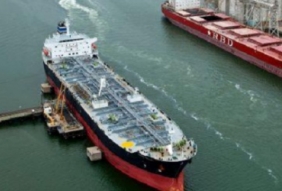
Posted on May 12, 2016
By Charles Zahn, Caller-Times
Last December, the federal government repealed a 40-year ban on exporting U.S. produced crude oil, legislation that was enacted originally to protect the United States from foreign oil shortages. This landmark achievement positions the Coastal Bend to be a major hub for crude exports, further strengthening the case to deepen and widen the Corpus Christi Ship Channel.
For 90 years the Port of Corpus Christi has served as a major economic engine for the Coastal Bend Region in its role as steward of waterborne commerce. This role has one main driver behind it — to position all its customers for success.
Founded in 1926, the port was originally developed to assist local cotton growers in selling their crops overseas. While still an agricultural hub, the port has evolved as its customer base has diversified from cotton growers to refineries, oil and gas midstream companies, iron producers, and a host of other industries as the Coastal Bend continues to attract large industrial investments. Currently more than $75 million of goods value per day move through the port.
The port is at another major inflection point in its rich history. The significant increase in U.S. energy production has presented a golden opportunity to increase exports. However, this opportunity can only be fully realized with the proper infrastructure required to ship U.S. goods overseas to the markets where they are most in demand. South Texas is on the tip of the spear of this opportunity, but its full potential will slip away without additional investments in the Corpus Christi Ship Channel, the mainstay of the Port of Corpus Christi.
Much like when the city of Corpus Christi needed the Crosstown Expressway and South Padre Island Drive in 1939 and 1958 respectively, the Corpus Christi Ship Channel also required change over the years. Originally built to a depth of 25 feet, the Corpus Christi Ship Channel is now a 35-mile-long, 45-foot-deep vessel “highway” allowing ships and barges to carry products to and from the South Texas region. It has been deepened five times, all in an effort to accommodate the evolution of larger ships and the increased traffic demands of growing businesses in the region. Further deepening of the channel combined with a new Corpus Christi Harbor Bridge will prove as a true game changer for South Texas.
Recent economic forecasts indicate huge growth in exports of liquefied petroleum gas through the port. With the ability to export crude, the ship channel undoubtedly requires further deepening and widening to handle the modern class of vessels essential for shipping these goods competitively to global markets. Many vessels leaving the port today depart half-full due to current depth restrictions. This is inefficient and ultimately noncompetitive.
Global ports, as well as the Suez and Panama canals, have deepened and widened their infrastructure to handle larger more fuel-efficient vessels. Ports that cannot or will not make the necessary investments will soon be obsolete. The question of who pays for these improvements always leads the argument against these projects. Yet the bigger question is who pays if these improvements are NOT made.
Simply put, the Port of Corpus Christi through its normal revenues (non-taxpayer funds) and the federal government pay for these improvements, and the Coastal Bend and the nation benefits.
There is strong backing for this project with community and business interests as well as bipartisan congressional support. Based on the most recent economic analysis completed by the U.S. Army Corps of Engineers in 2015, the project, estimated at $325 million to construct, would allow up to $86 million of transportation savings each year to industry. If the federal government commits one dollar of appropriation for the project, the port could begin the project with its cost share portion without raising user fees.
Thankfully, the Port of Corpus Christi has continued to position itself competitively over the years. This is largely due to its excellence in governance and its leadership in recognizing the necessary investments it must undertake to remain relevant in the highly competitive global markets. If the Corpus Christi Ship Channel deepening project does not start soon, Corpus Christi and South Texas will be left behind.
Source: Caller-Times





